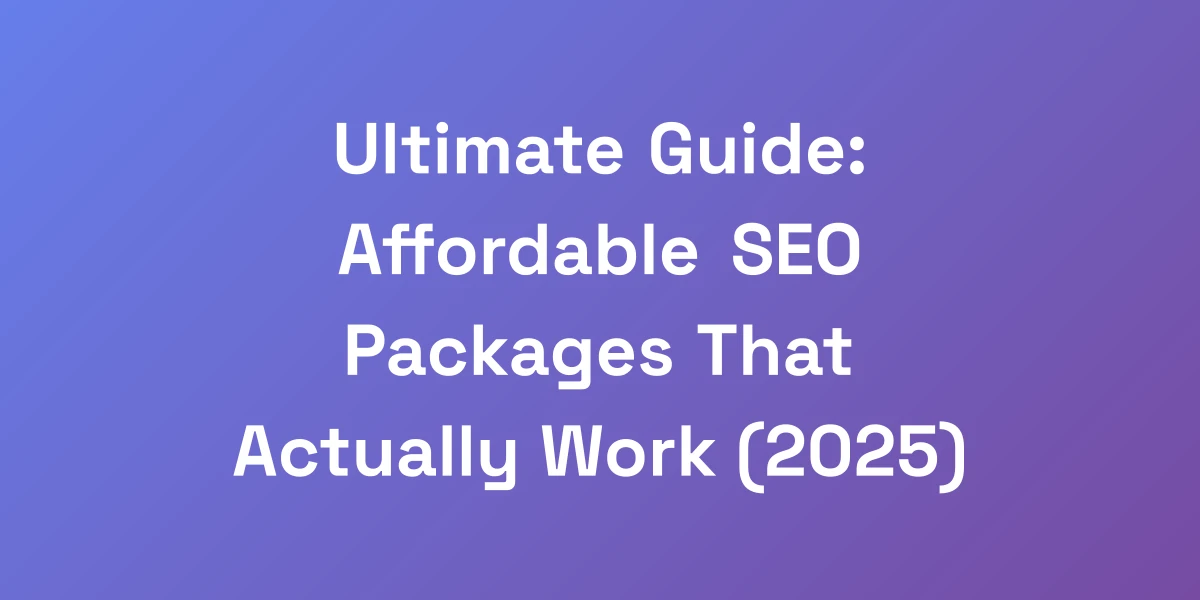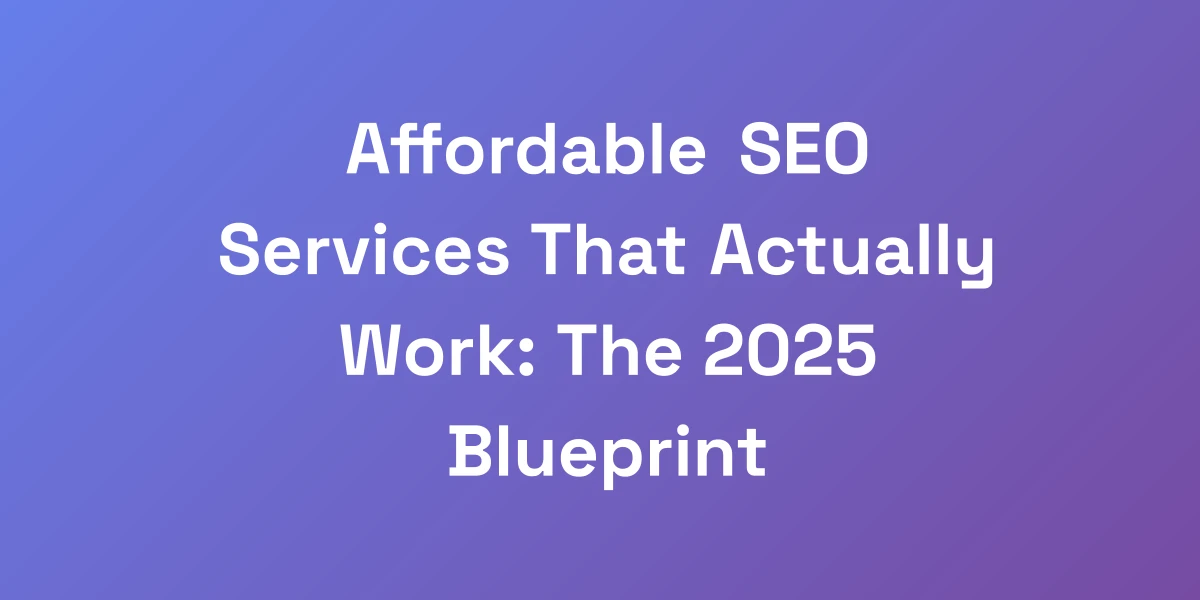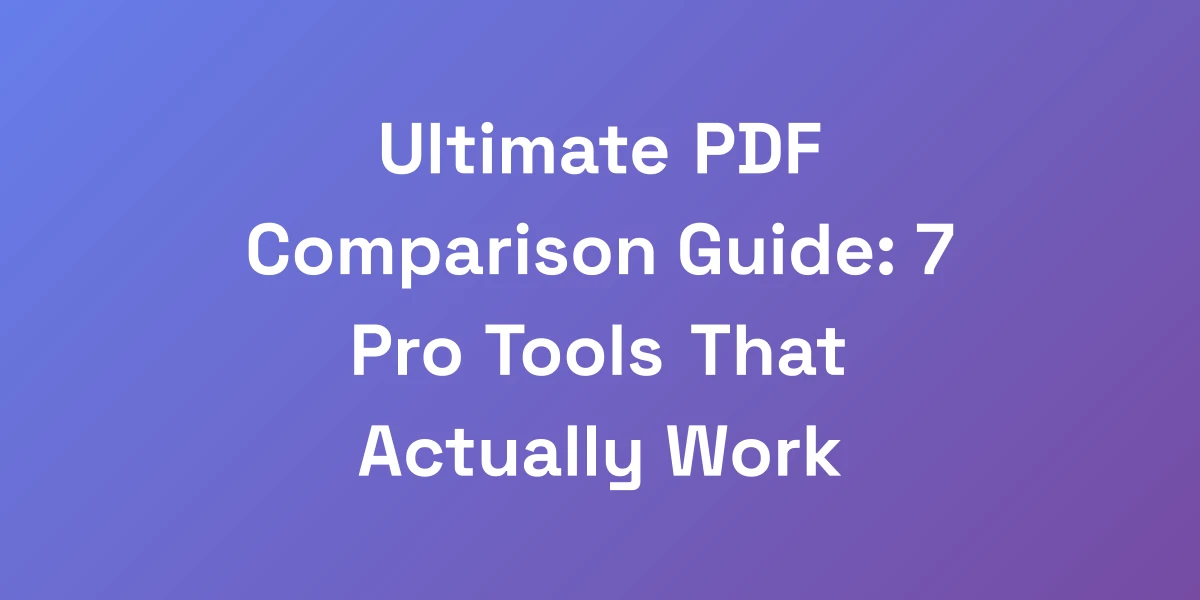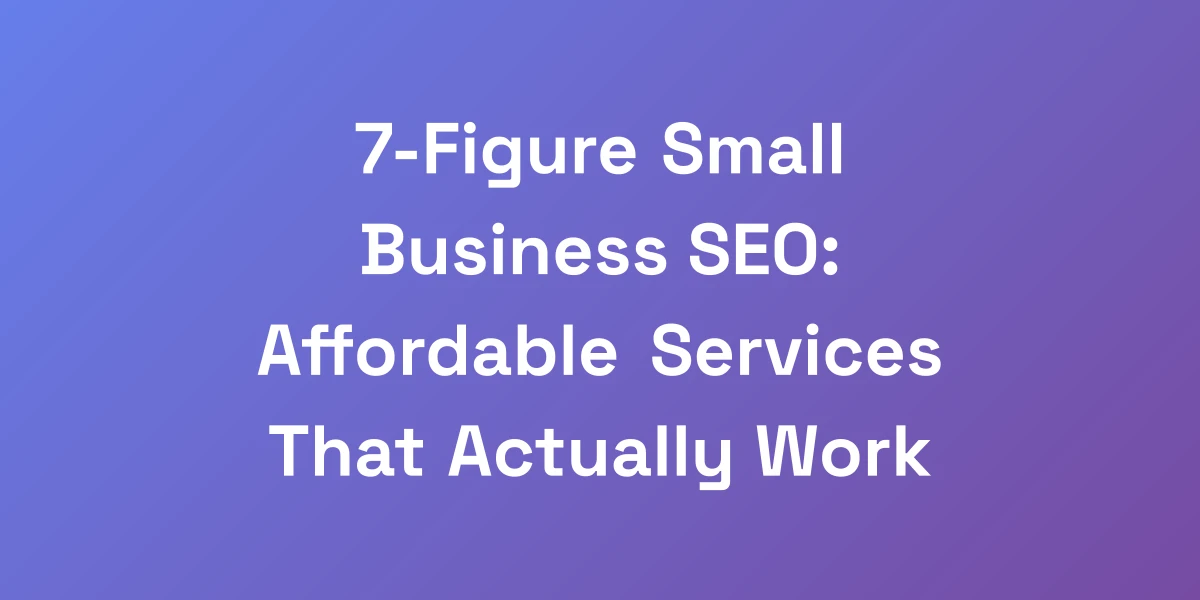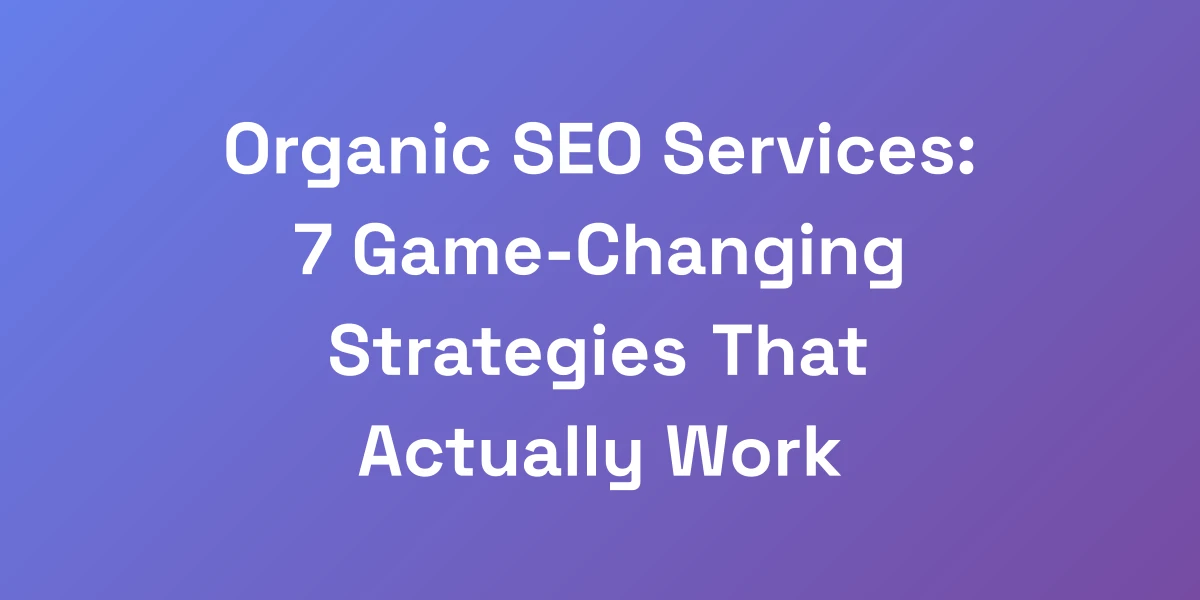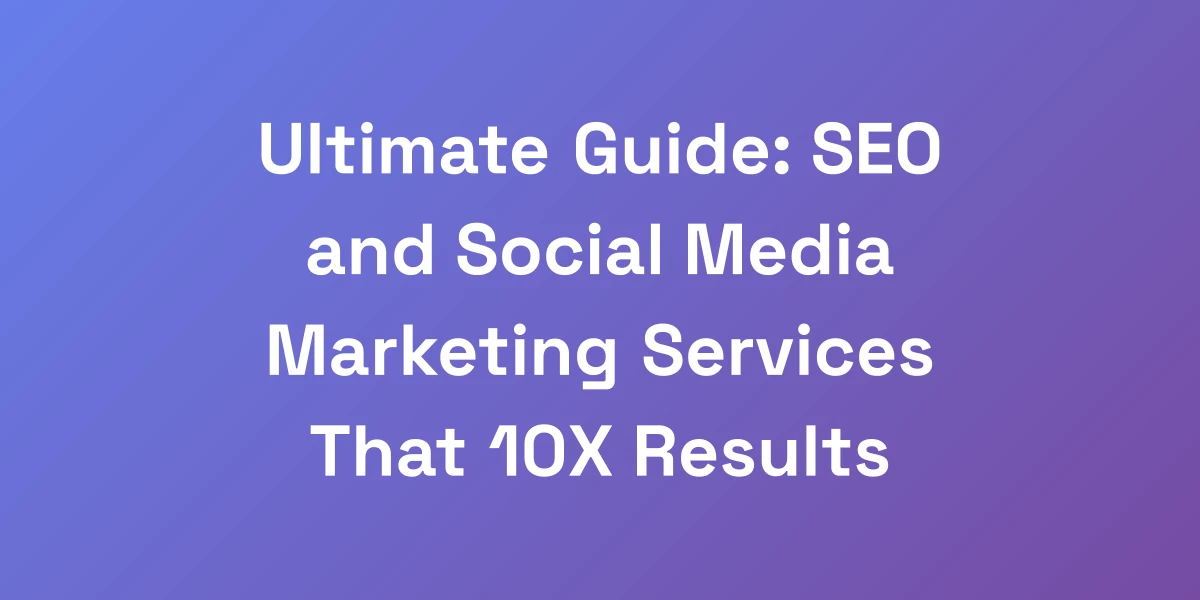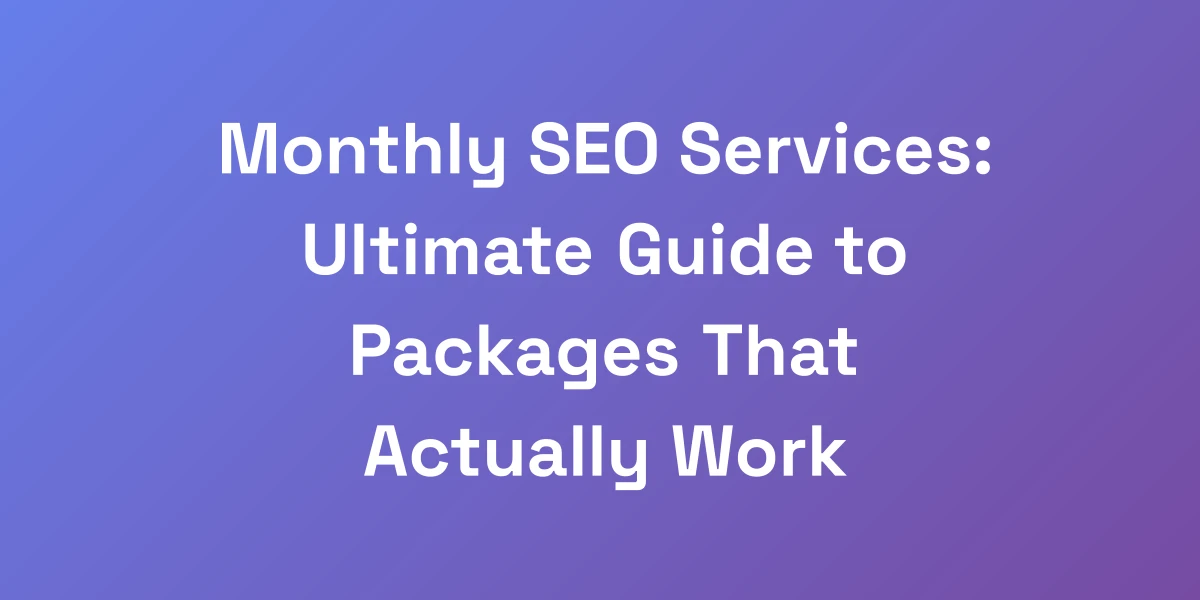
Monthly SEO Services: Ultimate Guide to Packages That Actually Work
Mar 1, 2025 | By [email protected]
Why Most Monthly SEO Services Are a Complete Waste of Money
Let’s cut through the BS – 91% of monthly SEO services packages are pure garbage. We’ve all been there, scouring the internet for that silver bullet SEO solution, only to end up with empty promises and zero results. It’s frustrating, isn’t it?
Imagine throwing your hard-earned money into a black hole, hoping it’ll magically make your website soar on Google rankings. Sounds absurd, right? Yet, countless businesses fall prey to subpar SEO services that offer little more than repackaged fluff. So, why does this happen, and how can you avoid being another statistic?
We’re diving deep into the murky waters of monthly SEO services, exposing the challenges and uncovering what really works. By the end, you’ll know exactly what to look for and what to steer clear of, ensuring your investment drives genuine results.
The Shocking Truth About $299 SEO Packages
Ever stumbled upon an SEO package priced at just $299 a month? It sounds like a steal, but don’t be fooled. For that price, what are you really getting?
Most of these low-cost packages offer a one-size-fits-all approach, with minimal customization. Think generic keyword stuffing, poor-quality backlinks, and cookie-cutter content that lacks depth. These tactics might offer a temporary bump, but they’re unsustainable and can even harm your site’s reputation in the long run.
Real success in SEO requires a strategic, tailored approach. Cheap packages often sidestep the hard work needed to create valuable content and build authoritative links. It’s no surprise that these services fail to deliver meaningful results.
Red Flags That Scream “Run Away Fast”
Spotting a bad SEO service early can save you time, money, and headaches. So, what are the warning signs?
- Guaranteed Rankings: SEO is unpredictable. Any service promising top rankings is hiding something.
- Lack of Transparency: If they’re vague about their methods, be cautious.
- No Custom Strategy: One-size-fits-all solutions rarely work. Personalized plans are a must.
- Poor Communication: If they’re hard to reach or don’t provide regular updates, it’s a red flag.
- Short Contract Terms: Reliable SEO needs time. Be wary of services pushing for quick, short-term contracts.
Recognizing these red flags can help you avoid dodgy providers and find a trustworthy SEO partner that truly understands your business needs.
What Actually Moves the Needle in SEO Today
So, what separates the effective SEO services from the rest? Let’s break it down:
- High-Quality Content: Content is still king. Creating valuable, engaging, and optimized content is non-negotiable.
- Technical SEO: Ensuring your website is technically sound – fast loading times, mobile-friendly, proper indexing – is crucial.
- Authoritative Backlinks: Building genuine, high-quality backlinks from reputable sites boosts your authority.
- User Experience (UX): Google rewards sites that offer excellent user experience, including easy navigation and interactive elements.
- Continuous Optimization: SEO isn’t a set-and-forget strategy. It requires ongoing adjustments and updates to stay ahead.
Focusing on these core areas ensures that your SEO efforts are robust and capable of driving long-term success.
For instance, utilizing AI-powered auto SEO software can significantly enhance your continuous optimization efforts by automating routine tasks and providing deep insights. Additionally, leveraging AI SEO tools can further optimize these efforts by automating complex tasks and providing actionable insights.
The Real Cost of Quality Monthly SEO
Quality SEO isn’t cheap, and rightly so. You get what you pay for. But how much does SEO cost should you actually spend?
Based on our research, small-scale SEO packages typically range between $1,500-$2,500 per month, while comprehensive services can go up to $3,000-$5,000. These costs reflect the depth and quality of the services provided, ensuring that every aspect of your SEO strategy is covered effectively.
Investing in quality SEO means accessing experienced professionals, customized strategies, and ongoing optimization efforts that drive real results. It’s an investment that pays off in the form of higher rankings, increased traffic, and ultimately, more revenue.
Why Cheaper Isn’t Always Expensive (Sometimes It Is)
At first glance, opting for a cheaper SEO service seems like a money-saver. But in reality, it might cost you more in the long run.
Cheap services often cut corners, leading to black-hat techniques that can result in penalties from search engines. Not to mention the time and resources wasted on ineffective strategies that don’t deliver the promised results.
On the flip side, investing in a reputable SEO service ensures that you’re following best practices, building a solid foundation for your online presence, and avoiding costly mistakes. Sometimes, spending a bit more upfront can save you from expensive setbacks down the road.
The Only Monthly SEO Package Components Worth Paying For
After analyzing hundreds of successful SEO campaigns, we’ve identified the core elements that actually drive rankings. Forget about those fancy reports and meaningless metrics – we’re talking about the raw components that make Google’s algorithm happy.
The secret sauce isn’t in having 50 different services; it’s about executing the right 5-6 things exceptionally well. Here’s what you should demand in any monthly SEO package worth its salt.
Content Strategy That Crushes Competition
Content is the foundation of any successful SEO content strategy. But not just any content – we’re talking about content that resonates with your audience and stands out from the competition.
- In-Depth Keyword Research: Identify the terms your audience is searching for and create content around those keywords.
- Quality Over Quantity: Focus on producing high-quality, valuable content rather than churning out大量 of mediocre articles.
- Diverse Content Formats: Incorporate blogs, videos, infographics, and other formats to engage a broader audience.
- Content Calendar: Maintain a consistent publishing schedule to keep your audience engaged and signal activity to search engines.
For example, Flyhomes saw a 10,737% traffic growth by expanding their website content to over 425K pages within three months, focusing on cost of living guides. This strategic expansion attracted over 1.1M monthly visits, demonstrating the power of a well-executed content strategy.
Technical SEO Audits That Matter
Technical SEO is often overlooked, but it’s a critical component that can make or break your SEO efforts.
- Site Speed Optimization: Ensure your website loads quickly to reduce bounce rates and improve user experience.
- Mobile Optimization: With mobile traffic dominating, a responsive design is essential.
- Structured Data: Implement schema markup to enhance your search listings with rich snippets.
- XML Sitemaps and Robots.txt: Properly configure these to ensure search engines can crawl and index your site effectively.
- Fixing Broken Links and Errors: Regularly check for and resolve any technical issues that could hinder your SEO performance.
MESHKI, an Australian clothing brand, achieved a 589% growth in traffic by launching a UK-focused domain, showcasing the importance of technical SEO in targeting specific markets and improving site performance. Incorporating AI-powered SEO tools can further enhance your technical audits, ensuring precision and efficiency.
Link Building That Isn’t Trash
Link building remains a cornerstone of SEO, but not all backlinks are created equal.
- Quality Over Quantity: Focus on acquiring backlinks from reputable, authoritative sites in your industry.
- Natural Link Acquisition: Avoid spammy tactics. Genuine content naturally attracts links.
- Diverse Link Profile: Ensure a mix of different types of backlinks – guest posts, directories, social mentions, etc.
- Monitor Backlinks: Regularly check your backlink profile to disavow any harmful links.
Growth Machine’s case studies highlight that strategic keyword targeting and content optimization can boost website traffic from less than 2,000 to over 166,000 visitors. Genuine, high-quality backlinks played a significant role in this dramatic increase.
Conversion Optimization (The Forgotten Gold Mine)
SEO isn’t just about driving traffic; it’s also about converting that traffic into customers.
- Landing Page Optimization: Ensure your landing pages are designed to convert, with clear calls to action and user-friendly layouts.
- A/B Testing: Continuously test different elements to see what works best for your audience.
- User Experience Enhancements: Improve site navigation, reduce load times, and ensure your site is mobile-friendly.
- Analytics Integration: Use tools like Google Analytics to track user behavior and optimize accordingly.
Many SEO services overlook conversion optimization, focusing solely on rankings. By integrating conversion optimization, you ensure that the increased traffic translates into tangible business results.
Monthly Deliverables Worth Their Weight
What exactly should you expect from your monthly SEO provider? Here are the fundamental deliverables that signify real progress.
- Comprehensive SEO Reports: Beyond vanity metrics, these reports should provide actionable insights and clear progress indicators.
- Content Updates: Regularly refresh and add new content based on the latest keyword research and trends.
- Backlink Analysis: Continuous monitoring and acquisition of high-quality backlinks.
- Technical Fixes: Ongoing identification and resolution of technical SEO issues.
- Strategic Adjustments: Adapt strategies based on performance data and algorithm updates.
These deliverables ensure that your SEO strategy remains dynamic and responsive to the ever-changing digital landscape.
Performance Tracking That Actually Means Something
Tracking performance is essential, but it needs to be meaningful.
- Relevant KPIs: Focus on metrics that align with your business goals, such as organic traffic, conversion rates, and keyword rankings.
- Regular Updates: Monthly check-ins to discuss performance and adjust strategies as needed.
- Data-Driven Decisions: Use analytics to guide your SEO efforts, ensuring that every action is backed by data.
With proper performance tracking, you can see what’s working, what’s not, and where to pivot your strategy for maximum impact.
How to Structure Your Monthly SEO Budget (Based on Real Data)
Here’s something most agencies won’t tell you: your SEO budget should be directly tied to your revenue potential. It’s not about how much you spend, but how effectively you allocate those funds.
We’ve seen companies blow $10K/month on SEO when they should’ve spent $2K, and others being too cheap when they should’ve gone all in. So, how do you strike the perfect balance? Let’s break it down.
The Perfect Budget Formula for Different Business Types
Different businesses have different needs. Here’s a basic formula based on business type:
- Small Businesses: Allocate around $1,500-$2,500 per month. Focus on local SEO, content creation, and fundamental technical SEO.
- Medium Businesses: Budget approximately $3,000-$5,000 monthly. Expand to include comprehensive content strategies, advanced technical SEO, and robust link-building efforts.
- Large Enterprises: Invest upwards of $5,000 per month. Engage in extensive content marketing, international SEO, detailed technical optimizations, and strategic partnership link-building.
Tailoring your budget to your business size ensures you’re investing adequately to meet your specific SEO needs.
Where to Splurge vs. Where to Save
Not all SEO services are created equal. Here’s where to be generous and where to cut corners:
- Splurge On: Quality content creation, technical SEO audits, and authoritative link building.
- Save On: Offloading basic tasks like minor site updates or initial keyword research.
Prioritizing your budget ensures that the most impactful areas receive the attention and resources they deserve.
Hidden Costs Nobody Talks About
SEO isn’t always straightforward. Be aware of additional costs that might sneak into your budget:
- Content Creation: High-quality content often requires significant investment.
- Tools and Software: SEO tools for keyword research, analytics, and tracking can add up.
- Link Building Expenses: Acquiring quality backlinks may involve outreach costs.
- Ongoing Training: SEO is dynamic, and staying updated requires continual learning and adaptation.
Being aware of these hidden costs helps you plan a more accurate and effective SEO budget.
Scaling Your SEO Investment Properly
As your business grows, so should your SEO investment. Here’s how to scale effectively:
- Monitor Performance: Use your KPIs to determine when it’s time to scale.
- Incremental Increases: Gradually increase your budget rather than making sudden jumps.
- Reallocate Funds: Shift your budget towards the most effective strategies as you scale.
Scaling strategically ensures that your SEO efforts continue to align with your growing business needs without overshooting your budget.
When to Double Down vs. When to Pull Back
Knowing when to invest more or cut back is crucial for maintaining an optimal SEO budget.
- Double Down When: You see positive ROI, rankings are improving, and traffic is increasing consistently.
- Pull Back When: Results plateau, ROI diminishes, or there are signs of diminishing returns.
Regularly assessing your SEO performance against your goals helps you make informed decisions on whether to ramp up or scale back your investment.
ROI Tracking Systems That Work
Tracking ROI isn’t just about numbers; it’s about understanding the value your SEO efforts bring to your business.
- Set Clear Goals: Define what success looks like for your SEO strategy.
- Use Reliable Tools: Platforms like Google Analytics, SEMrush, and Ahrefs can help track performance accurately.
- Regular Reviews: Conduct monthly reviews to assess progress and adjust strategies accordingly.
Implementing effective ROI tracking ensures that your SEO investment is delivering the results you expect and provides a clear path for future optimization.
How to Hire Monthly SEO Services That Don’t Suck
After getting burned multiple times (and wasting serious cash), we’ve developed a bulletproof system for vetting SEO providers. The key isn’t in their fancy proposals or case studies – it’s in asking the right questions and knowing how to interpret their answers.
Here’s how to sift through the noise and find a partner that will actually help your business grow.
The Only Questions You Need to Ask
Start your vetting process with these essential questions:
- What is your SEO strategy? Look for detailed, customized approaches rather than generic tactics.
- Can you provide case studies or references? Authentic success stories and satisfied clients speak volumes.
- How do you measure success? They should use clear, relevant KPIs aligned with your business goals.
- What tools do you use? Reliable tools indicate a professional and data-driven approach.
- How do you stay updated with SEO trends? SEO is ever-changing, so continuous learning is crucial.
These questions help you gauge their expertise and ensure their methods align with best practices.
Proposal Red Flags to Watch For
Even the best proposals can hide potential issues. Watch out for these red flags:
- Vague Deliverables: A good proposal should outline specific services and expected outcomes.
- Guaranteed Results: As mentioned earlier, SEO results can’t be guaranteed due to its dynamic nature.
- Overemphasis on Quick Wins: Sustainable SEO requires long-term strategies, not overnight fixes.
- Lack of Transparency: If they’re not clear about their processes, they might be hiding something.
A well-crafted proposal should be clear, detailed, and set realistic expectations.
Contract Terms That Protect You
Your contract should safeguard your interests. Here’s what to look for:
- Clear Scope of Work: Define exactly what services are included and what aren’t.
- Payment Terms: Transparent billing practices and clear payment schedules are essential.
- Performance Clauses: Outline expectations and consequences if targets aren’t met.
- Termination Conditions: Ensure there are fair terms for ending the contract if needed.
Protecting yourself through well-defined contract terms prevents future disputes and ensures a smooth working relationship.
Communication Expectations and Standards
Effective communication is the backbone of a successful partnership. Here’s how to set the right expectations:
- Regular Updates: Agree on a schedule for meetings and progress reports, whether it’s weekly, bi-weekly, or monthly.
- Point of Contact: Have a dedicated person or team you can reach out to with questions or concerns.
- Clear Reporting: Reports should be easy to understand, highlighting key metrics and actionable insights.
Establishing clear communication channels ensures that both parties are aligned and any issues are addressed promptly.
Performance Guarantees Worth Having
While no one can promise specific rankings, some performance guarantees can provide peace of mind:
- Commitment to Best Practices: Ensure the provider adheres to ethical SEO practices that comply with search engine guidelines.
- Ongoing Optimization: They should commit to regularly refining and adjusting strategies based on performance data.
- Transparent Reporting: Guarantees around regular, honest reporting build trust and accountability.
These guarantees help ensure that your SEO efforts are handled professionally and ethically.
Exit Strategies When Things Go Wrong
Despite best efforts, sometimes things don’t work out. Here’s how to protect yourself:
- Clear Termination Clauses: The contract should outline how and when either party can terminate the agreement.
- Data Ownership: Ensure you retain ownership of all data and content created during the partnership.
- Transition Plans: Have a plan in place for transitioning your SEO efforts if you decide to switch providers.
Having these exit strategies in place ensures that you can smoothly end the partnership without losing valuable assets or data.
Conclusion
Choosing the right monthly SEO services can be the game-changer your business needs. By understanding the pitfalls of low-quality packages and knowing what to look for in a reputable provider, you can make informed decisions that drive real results.
Remember, it’s not about finding the cheapest option, but about investing in a service that delivers value and aligns with your business goals. Focus on quality content, robust technical SEO, and genuine link-building to ensure your site stands out in the crowded digital landscape.
Ready to take your SEO to the next level? Start by evaluating your current strategy, setting clear goals, and partnering with a trusted SEO provider that meets the criteria outlined in this guide.
What’s your biggest challenge with SEO right now? Let us know in the comments below, and let’s tackle it together!
